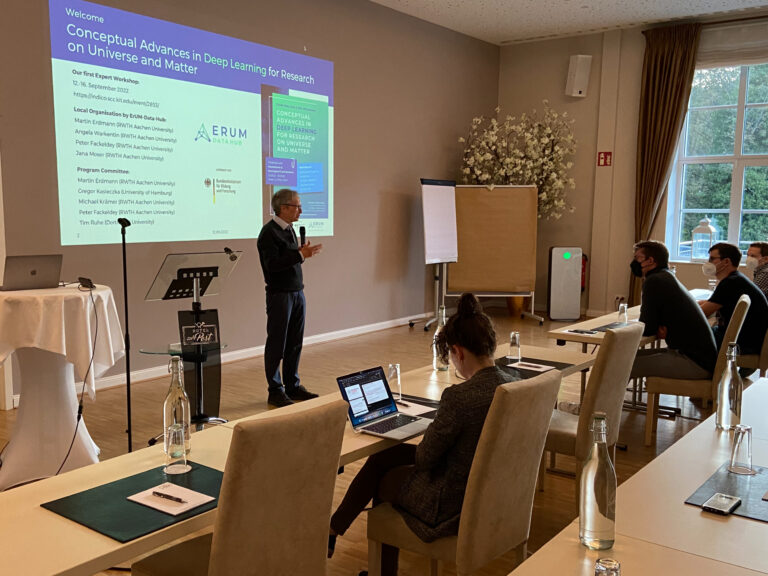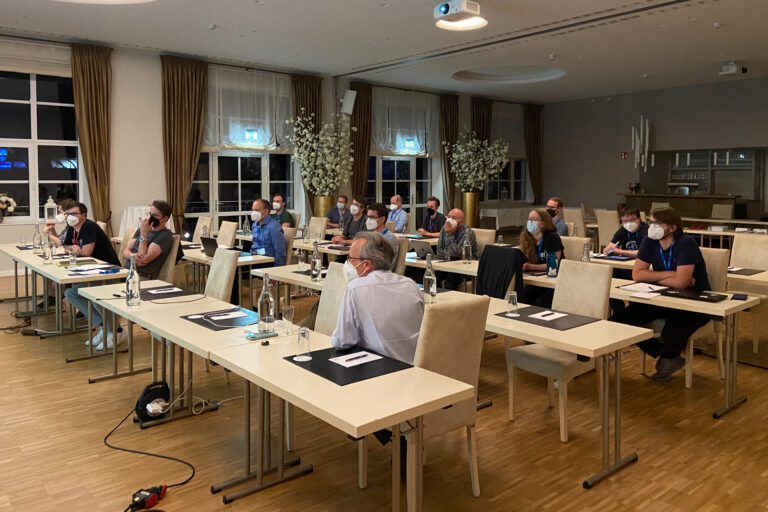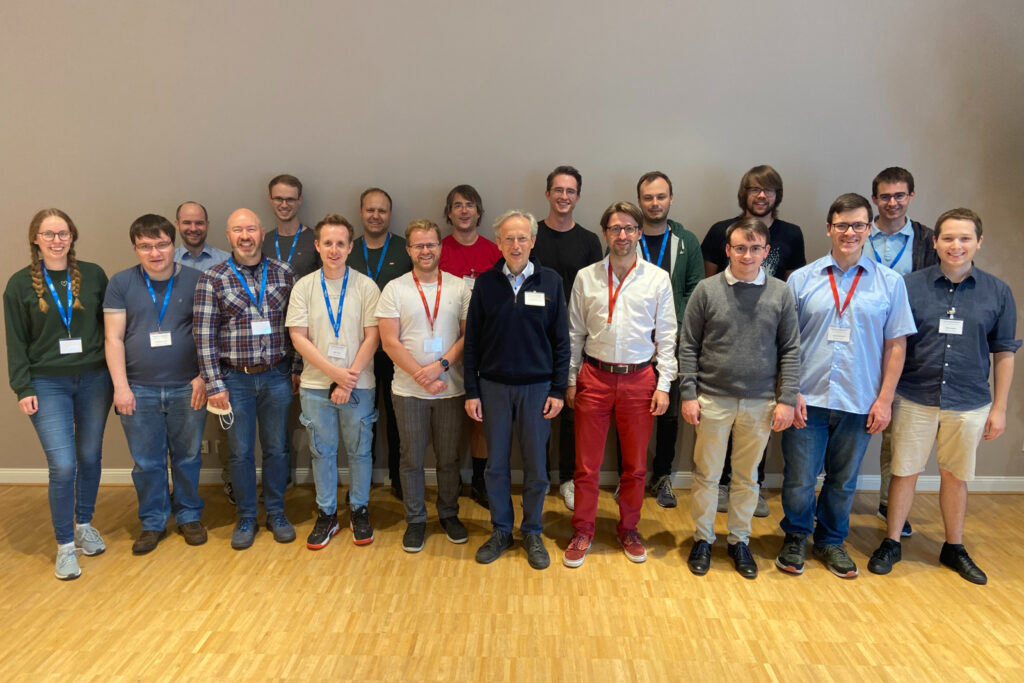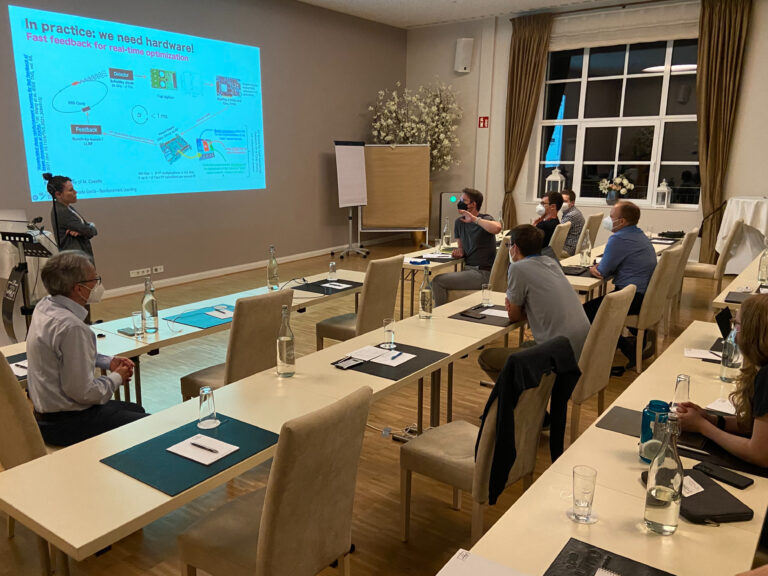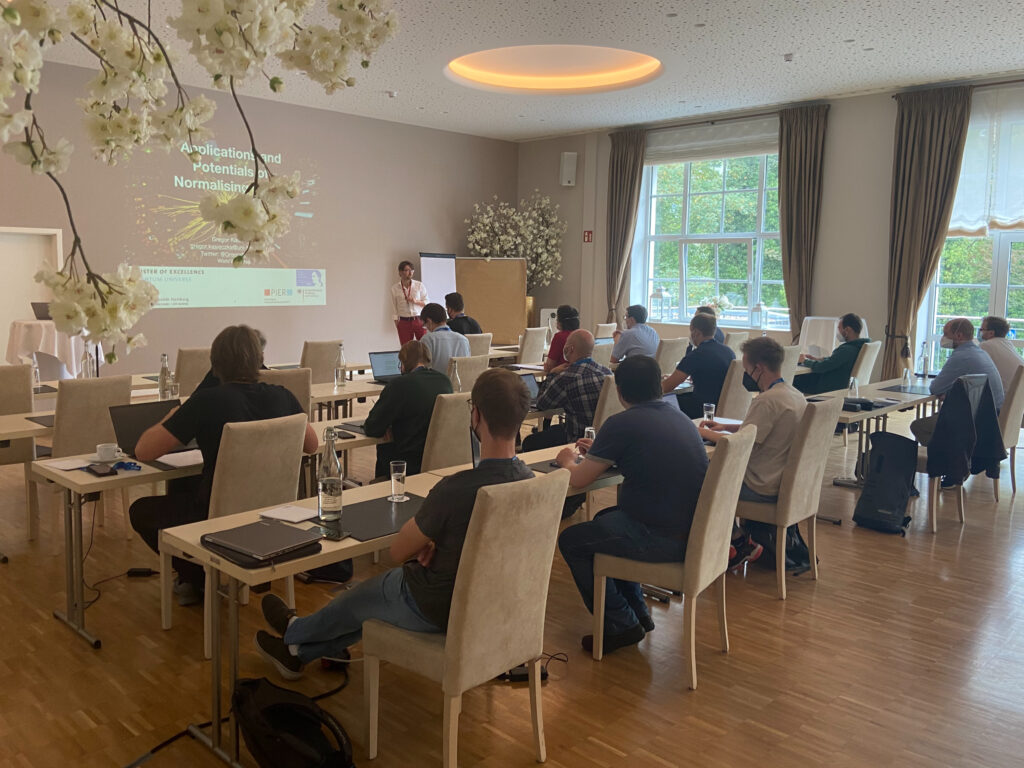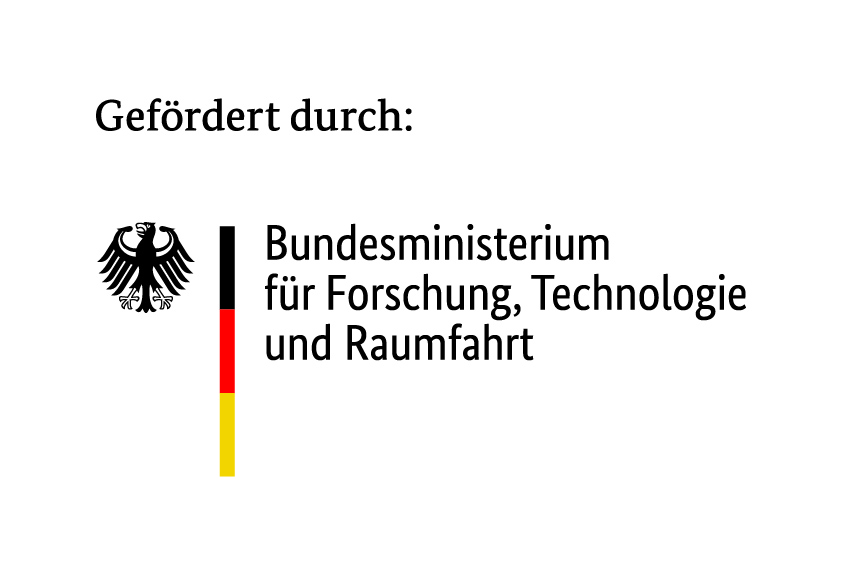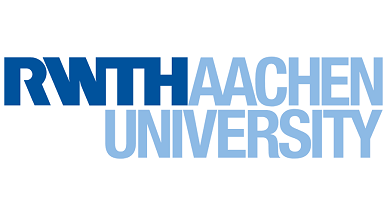Review
Our first Expert Workshop is characterized by lively discussions, personal conversations and challenging content
The feedback of the participants of the first ErUM Data Hub Expert Workshop is clear: it was a future-oriented and content-rich week.
From September 12 to 16, 2022, the ErUM-Data-Hub invited experts from different ErUM communities to the Hotel zur Post in Wiehl to discuss concepts of Deep Learning and their impact on the research on universe and matter. The program consisted of contributions by the participants followed by questions and discussions, keynotes on selected concepts, and complementary hackathons.
The group of 23 PhD students, post-docs, senior scientists and professors was composed of a wide range of disciplines. With 7 ErUM communities represented (KAT, KET, KfB, KFN, KFS, KHuK and RDS), a broad spectrum of perspectives on the topic was provided. An additional perspective came in the form of a participant from the industrial sector.
An intensive and varied program
After a first dinner on Monday, Dr. Andrea Santamaria Garcia (KIT) opened the workshop with an evening lecture on Reinforcement Learning in the Research Field of Accelerators. Already at this point, a dynamic working atmosphere became apparent. The participants showed a lively interest and made extensive use of the opportunity to inquire and discuss.
Tuesday morning was dedicated to the first 4 participant presentations after everyone had fortified themselves at the extensive breakfast buffet. Dennis Noll (RWTH Aachen University) started with a presentation on Reinforced Jet-Parton Assignment for Particle Physics Analyses. This was followed by contributions from Sven Günther (RWTH Aachen University) on CosmicNet II: Emulating extended Cosmologies with Efficient and Accurate Neural Networks and Dr. Samuel Spencer (Friedrich Alexander University Erlangen) on The State of the Art of Deep-Learning-Based Event Classification and Reconstruction for IACTs. Dr. Andreas Fehlner (TRUMPF Laser GmbH / Heidelberg Institute for Theoretical Studies) bridged the gap to the private sector with the topic Open Neural Network Exchange Format.
Niklas Langner (RWTH Aachen University) rounded off the Tuesday morning with a keynote on Transformers. After lunch, the participants had the opportunity to explore this concept in more depth within a hackathon.
Prof. Dr. Tilman Plehn (University of Heidelberg) kicked off Wednesday with a talk on Transfer of Neural Network Probability to Analytic Expressions. Niklas Langner contributed a hackathon on Graph Neural Networks to the program. Lunch and the following break were used by the group to deepen contacts and personal conversations, to discuss scientific topics together and to gain new energy for the afternoon.
The afternoon planning was entirely in the spirit of the participants' contributions. A total of 6 presentations were held and discussed:
- Dr. Johannes Erdmann (RWTH Aachen University): Bayesian Neural Networks for Particle Identification
- Thorben Finke (RWTH Aachen University): Boosting Mono-jet Searches with Model Agnostic Deep Learning
- Florian Mausolf (RWTH Aachen University): Super-resolution of Photon Calorimeter Images using Generative Adversarial Networks
- Marius Neumann (Bielefeld University): An ML Approach to the Classification of Phase Transitions in many flavor QCD
- Katrin Nippel (RWTH Aachen University): A Machine Learning Approach to Searching Dark Matter Subhalos in Fermi-LAT Sources
- Markus Osterhoff (University Göttingen): Virtual Patho-Histology at the GINIX 3D X-ray Microscope
Thursday morning's session started with participants Stefan Fröse (TU Dortmund University) speaking on Deep Learning based Imaging in Radio Interferometry, Jakob Roth (Max Planck Institute for Astrophysics) presenting on Bayesian Inference for Fields in Information Field Theory, and Maximilian Straub (RWTH Aachen University) on Interpolating Calibration Data on the Sphere with Formation Field Theory.
Afterwards, the group dove into Applications and Potentials of Normalizing Flows with Prof. Dr. Gregor Kasieczka (University of Hamburg). After lunch, the participants were able to deepen and test their newly acquired knowledge in a hackathon on normalizing flows.
The last workshop day was designed by Prof. Dr. Michael Krämer (RWTH Aachen University), who brought a keynote and a hackathon on autoencoders. After a short review of the productive week and a last lunch together, the participants started their journey home.
Creating progress together
What distinguishes the format of this first ErUM-Data-Hub Expert Workshop is the networking between and direct exchange among researchers from different ErUM fields at a high academic level. The time slot for discussion and debate after all presentations was highly appreciated by the group.
In addition to networking and discussion, the goal of the workshop was to intensively and practically comprehend newly learned concepts. The hackathons designed for this purpose were enthusiastically embraced by the group. The concentrated work in the seminar room was usually only interrupted by the call for dinner.
Perspectives in the Research on Universe and Matter
Overall, the ErUM-Data-Hub received very positive feedback on the event format and looks forward to continuing to support ErUM researchers in discovering and advancing new Deep Learning concepts together next year.
We would like to thank all speakers and tutors for organizing an exciting workshop, as well as all participants who contributed significantly to the success of the event with their contributions. We would also like to thank the BMBF for its financial support.

